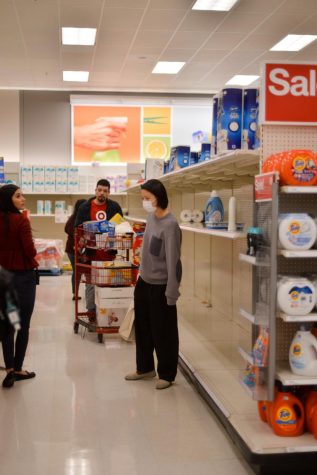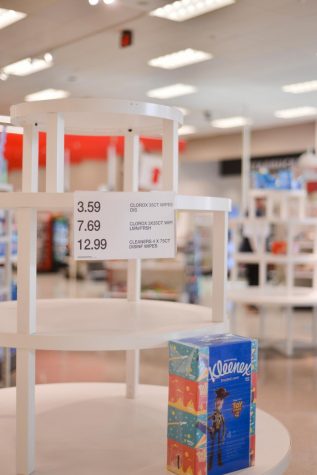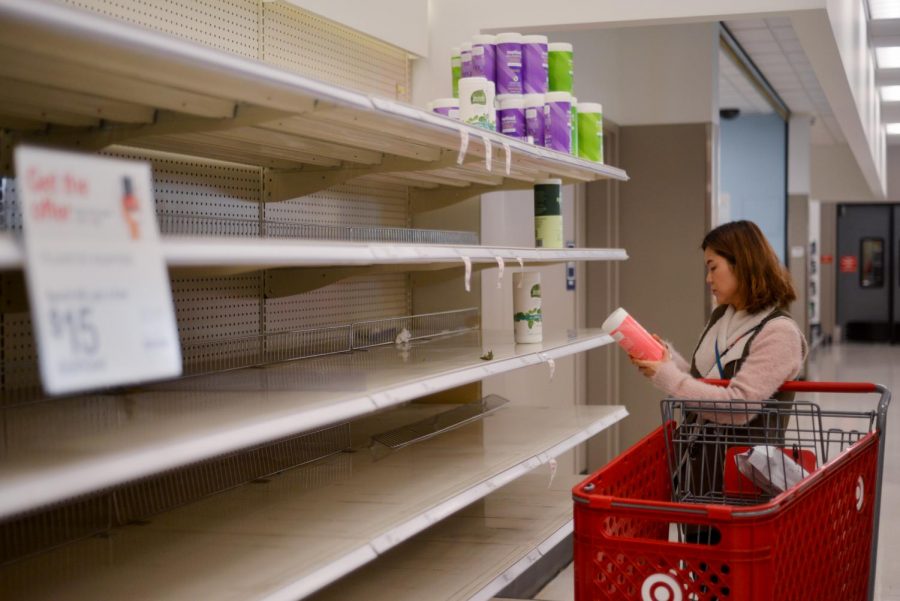Novel coronavirus: How to prepare for potential local outbreak
Browsing nearly empty shelves, a customer shops for surface wipes at Target in the Westgate Center. Stores like Target and Costco have been running low on hygiene products in the past week as local residents stock up on essential supplies to prepare for a potential COVID-19 outbreak.
With the rise of confirmed cases of the novel coronavirus, COVID-19, in Santa Clara County last week, as well as the report of the first possible case of community spread in the U.S. in California last Wednesday, the Centers for Disease Control and Prevention and local health agencies encourage residents to start preparations for a potential local outbreak of the virus.
Here’s what you need to know in order to prepare.
What is the school’s plan in case of a local outbreak of COVID-19?
Nott emailed all Harker families with information on the school’s plan in case of a local outbreak of COVID-19. According to Nott, the school’s experience with the H1N1 outbreak in 2009 has established a protocol for activity cancellation, school closure and teleschooling.
“Cancelling activities will certainly impact our program, but we will follow the directions of the health department and CDC to do what is necessary to keep the students and staff healthy and safe,” Nott wrote in the email.
Among all upcoming school trips, only the art and anatomy trip to Italy, which had been planned for spring break, has been rescheduled. The upcoming journalism trip to New York City and the orchestra trip to New York City during spring break will currently proceed as planned.
Science department chair Anita Chetty, who is one of the teachers leading this trip, says that she and trip organizers are looking at possibly moving the trip to May 26 through June 5. The finalized plan will be announced next week.
Is there a cure or vaccine?
The CDC has also updated its criteria for COVID-19 tests. All patients with a fever and severe acute lower respiratory illness without another diagnosis, such as influenza, should be tested for COVID-19.
Currently, there is no vaccine for COVID-19 and no medication proven to treat it. The CDC reports that all care for patients diagnosed with COVID-19 is supportive.

A customer wearing a mask looks for packs of toilet paper at the Target in Westgate Center. Target and other stores like Costco and CVS have run low on supplies like toilet paper, surface wipes and hand sanitizer following reports of community spread of the novel coronavirus, COVID-19, in California.
How do we prevent against COVID-19?
In terms of preventive measures, the CDC recommends avoiding close contact with infected people, not touching your eyes, nose, and mouth, staying home when you are sick, covering coughs and sneezes with a tissue, regularly disinfecting surfaces, washing your hands thoroughly, and wearing a face mask if you are sick.
Upper school biology teacher Anita Chetty strongly emphasizes washing hands as a protective measure and encourages people to adopt that into their regular everyday routines to prevent any threats to their health, even in the future.
“There is always something that is going to cause disease amongst our population or other living things. Wash your hands: that’s a habit that needs to be developed and it just becomes a part of what you do,” Chetty said.
Dr. Messonnier advises non-pharmaceutical interventions, or NPIs, as the “the most important tools in our response to this virus.” NPIs include three categories of preventative measures: personal, community and environment.
Personal measures include similar measures as influenza prevention, such as staying home when sick, covering coughs, washing hands and voluntary home quarantine. Community measures include social distancing, school closures or dismissal and, in the case of a severe pandemic, replacing physical meetings with telecommunication options. Environment measures include consistent surface cleaning, modifying or postponing large scale gatherings and possibly increasing telehealth services or delaying elective surgery.
“We recognize that implementing NPIs at this level will be disruptive to people’s day to day lives, and we really want to prepare the American public for the possibility that their lives will be disrupted because of this pandemic,” Dr. Messonnier said in Tuesday’s telebriefing.
What other administrative actions are local and federal government agencies taking?
The U.S. State Department has issued travel advisories to Macau, Hong Kong, Iran, Italy, Japan, Mongolia and South Korea, and a travel restriction on China and Iran as of March 2. According to Dr. Messonnier, the U.S. State Department and Department of Health and Human Services are working to implement an aggressive containment strategy that detects, tracks and isolates all cases and prevents more introduction of the disease, especially at points of entry.
Last Tuesday, San Francisco’s Mayor London Breed declared a state of emergency in the city, citing the high volume of travel between San Francisco and China as a basis for taking precautions. There have been no confirmed cases of COVID-19 in San Francisco.
Despite cutting funding for the CDC in the 2020 fiscal budget, President Donald Trump and his administration have requested an allocation of 1.25 billion dollars of emergency dollars to bolster response efforts towards the coronavirus outbreak. The administration also requested that Congress reappropriate 535 million dollars from the emergency supplemental funding originally allocated for Ebola prevention, bringing the total amount of requested funding towards response efforts to 1.8 billion.
What other factors should we be thinking about?
According to the CDC, residents across the U.S. are encouraged to start preparing for the possibility that community spread does occur.

An empty shelf that used to hold disinfectant wipes at the Westgate location of Target.
The CDC suggests considering stocking up on essential supplies, forming emergency plans in case public transport is no longer advised and working out teleschooling, teleworking and telehealth options.
Currently, local stores like Target and Costco are running low on stock for hygiene supplies, such as hand sanitizer, surface wipes and toilet paper, as well as dry foods like rice and canned soup. According to employees at the Target in Westgate Center, Saratoga, Target is still relying on normal shipments of supplies, which arrive at the store once a week.
Upper school biology teacher Dr. Kate Schafer emphasizes the COVID-19 outbreak as one to learn from to mitigate similar events in the future.
“Coronavirus is something that’s come out of nowhere. I think we’re afraid of [coronavirus because it] seems to be unique. [Hopefully] we learn some valuable lessons from this about how to prevent future events like this from happening,” Dr. Schafer said.

Kathy Fang (12) is the editor-in-chief of Harker Aquila. This is her fourth year on staff. From covering local marches and protests to initiating Harker...
Varsha Rammohan (12) is the co-editor-in-chief of Harker Aquila. This is her fourth year on staff, and she likes journalism since she can meet new people...
Arushi Saxena (12) is the co-managing editor of Harker Aquila. This is her fourth year on staff, and she hopes to develop her skills as a writer, photographer...


















![“[Building nerf blasters] became this outlet of creativity for me that hasn't been matched by anything else. The process [of] making a build complete to your desire is such a painstakingly difficult process, but I've had to learn from [the skills needed from] soldering to proper painting. There's so many different options for everything, if you think about it, it exists. The best part is [that] if it doesn't exist, you can build it yourself," Ishaan Parate said.](https://harkeraquila.com/wp-content/uploads/2022/08/DSC_8149-900x604.jpg)




![“When I came into high school, I was ready to be a follower. But DECA was a game changer for me. It helped me overcome my fear of public speaking, and it's played such a major role in who I've become today. To be able to successfully lead a chapter of 150 students, an officer team and be one of the upperclassmen I once really admired is something I'm [really] proud of,” Anvitha Tummala ('21) said.](https://harkeraquila.com/wp-content/uploads/2021/07/Screen-Shot-2021-07-25-at-9.50.05-AM-900x594.png)







![“I think getting up in the morning and having a sense of purpose [is exciting]. I think without a certain amount of drive, life is kind of obsolete and mundane, and I think having that every single day is what makes each day unique and kind of makes life exciting,” Neymika Jain (12) said.](https://harkeraquila.com/wp-content/uploads/2017/06/Screen-Shot-2017-06-03-at-4.54.16-PM.png)








![“My slogan is ‘slow feet, don’t eat, and I’m hungry.’ You need to run fast to get where you are–you aren't going to get those championships if you aren't fast,” Angel Cervantes (12) said. “I want to do well in school on my tests and in track and win championships for my team. I live by that, [and] I can do that anywhere: in the classroom or on the field.”](https://harkeraquila.com/wp-content/uploads/2018/06/DSC5146-900x601.jpg)
![“[Volleyball has] taught me how to fall correctly, and another thing it taught is that you don’t have to be the best at something to be good at it. If you just hit the ball in a smart way, then it still scores points and you’re good at it. You could be a background player and still make a much bigger impact on the team than you would think,” Anya Gert (’20) said.](https://harkeraquila.com/wp-content/uploads/2020/06/AnnaGert_JinTuan_HoHPhotoEdited-600x900.jpeg)

![“I'm not nearly there yet, but [my confidence has] definitely been getting better since I was pretty shy and timid coming into Harker my freshman year. I know that there's a lot of people that are really confident in what they do, and I really admire them. Everyone's so driven and that has really pushed me to kind of try to find my own place in high school and be more confident,” Alyssa Huang (’20) said.](https://harkeraquila.com/wp-content/uploads/2020/06/AlyssaHuang_EmilyChen_HoHPhoto-900x749.jpeg)




